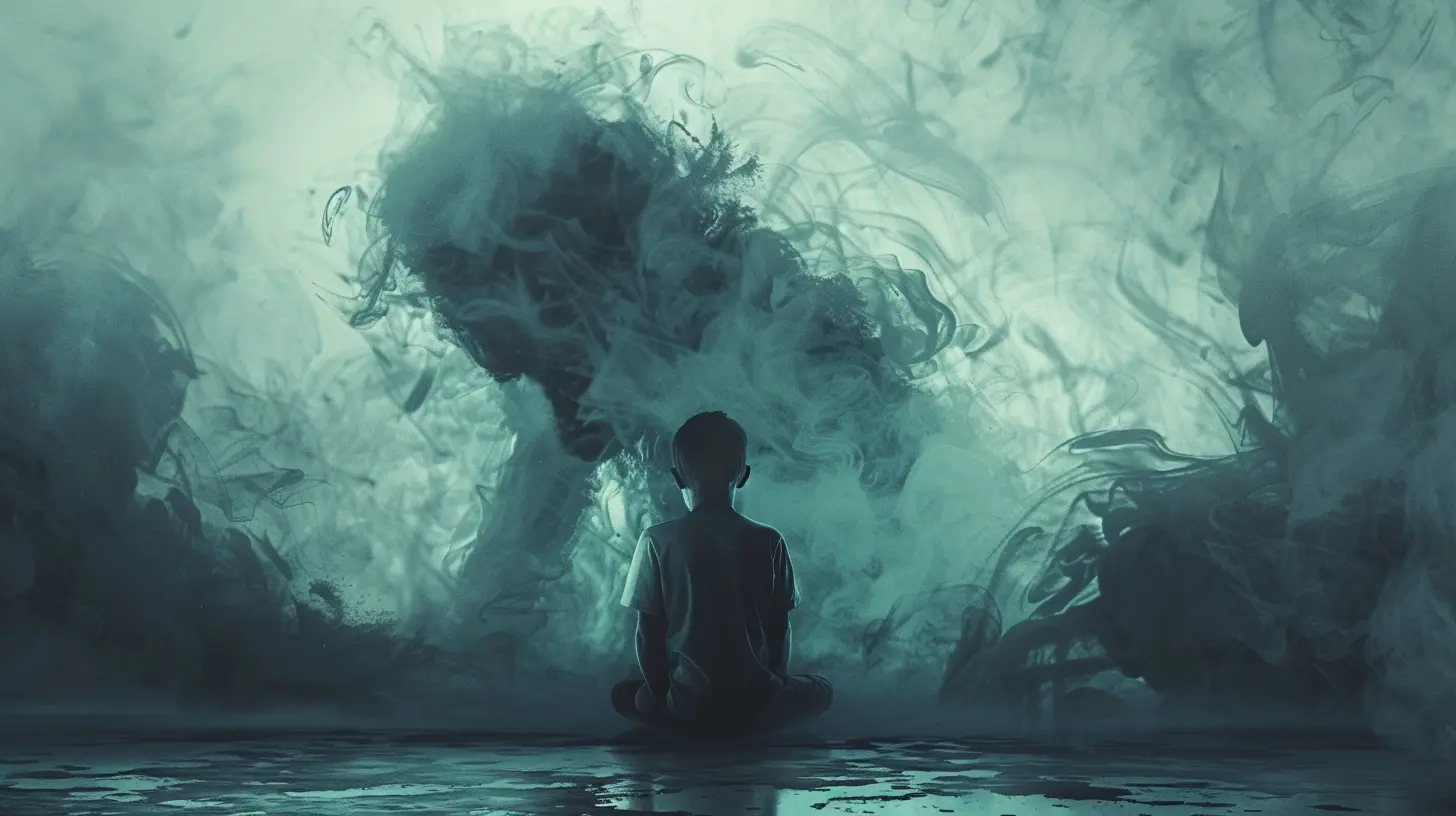The Long-Term Effects of Untreated Childhood Anxiety
13 November 2025
Let’s face it—childhood is supposed to be full of laughter, scraped knees, and endless curiosity. But for some kids, anxiety sneaks in and crashes the party. It's like carrying a heavy backpack every day that no one else can see. When left untreated, that anxious feeling doesn’t just magically disappear with age. Nope—it can tag along into adulthood, shaping everything from our relationships to our jobs to how we feel about ourselves.
In this article, we'll dive into the long-term effects of untreated childhood anxiety. Don’t worry—it’s not all doom and gloom! We’ll look at what happens when anxiety is ignored, sure, but we’ll also sprinkle in some encouragement, hope, and maybe a few laughs along the way. Sounds good? Great—let’s get into it.
What Is Childhood Anxiety, Anyway?
First off, let's clear the air: all kids worry sometimes. It's totally normal for little ones to get nervous before a big test or feel uneasy about sleeping in the dark. But childhood anxiety steps it up a notch. We're talking about chronic worry, fear that doesn’t go away, and behaviors that interfere with school, friendships, or playtime.It’s like your brain’s alarm system is stuck on high alert—even when there’s no danger.
Common types of childhood anxiety include:
- Generalized Anxiety Disorder (GAD) – The "worry about everything" type
- Social Anxiety Disorder – Fear of being judged or embarrassed
- Separation Anxiety – The classic “Don’t leave me, Mom!” scenario
- Specific Phobias – Irrational fears of things like dogs, clowns, or even bananas (yes, it happens!)
Spoiler Alert: Kids Don’t Just "Grow Out of It"
One of the biggest myths out there is that children eventually outgrow their anxiety. While some might, many carry those anxious thoughts and habits right into their teen and adult years—like an emotional hand-me-down that doesn’t quite fit.Ignoring childhood anxiety is kind of like ignoring a leaky pipe. At first, it seems small. A drip here, a drip there. But over time? Uh-oh. Now you've got water damage, mold, and a serious mess to clean up.
So, what happens when we let childhood anxiety fester without support or treatment? Let’s break it down.
1. Struggles with Mental Health in Adulthood
One of the biggest red flags? Untreated childhood anxiety often morphs into other mental health challenges later in life.Anxiety Doesn’t Retire at 18
Just because someone turns 18 doesn’t mean their anxiety clocks out. In fact, studies show that children with untreated anxiety are far more likely to develop:- Chronic anxiety disorders
- Depression
- Panic attacks
- Substance use problems
The brain learns patterns early—so if a child’s main coping mechanism is avoidance or self-doubt, those strategies tend to stick. It’s like setting your GPS to "Worry Mode" and never recalculating.
2. Academic and Career Setbacks
Think about it: a child who’s constantly anxious might struggle to concentrate in class. They may avoid participating for fear of being wrong or judged. Over time, this quiet hesitation can snowball into lower grades, fewer opportunities, and missed chances to shine.Fast forward to adulthood, and that same person might:
- Feel overwhelmed by interviews or performance reviews
- Avoid promotions due to fear of failure
- Undervalue their own skills and potential
It’s frustrating, right? They’ve got the talent—they just can’t get past the mental traffic jam.
3. Strained Relationships (Hello, Emotional Baggage)
Let’s be real—anxiety can get in the way of forming healthy relationships. Kids who grow up excessively worried or fearful might have trouble trusting others, expressing emotions, or setting boundaries. That anxiety can morph into:- Fear of rejection
- Constant people-pleasing
- Overanalyzing every conversation (raise your hand if you've replayed one awkward moment 50 times)
Whether it’s with friends, partners, or coworkers, this emotional baggage adds weight to relationships. And it all stems from patterns that took root way back when someone was just a worried little kid.
4. Physical Health Problems (Because Anxiety Isn’t Just in Your Head)
Here’s something people often overlook: anxiety doesn’t just mess with your mind—it can take a toll on your body, too. Chronic stress from anxiety can lead to:- Headaches and migraines
- Stomach issues and digestive problems
- Sleep disturbances
- Higher risk of heart disease
Basically, when anxiety goes unchecked, your nervous system stays in overdrive. It’s like leaving your car engine running for years—eventually, something’s going to break down.
5. Low Self-Esteem and Self-Doubt
Children with untreated anxiety often internalize their struggles. They start believing things like:- “I’m not good enough.”
- “I’ll mess this up.”
- “Everyone’s better than me.”
These thoughts don’t just disappear over time. Instead, they plant themselves deep into a person’s identity. Suddenly, that once-shy kid becomes an adult who won't speak up in meetings, pursue their passions, or take healthy risks—all because self-doubt has taken the wheel.
6. Missed Opportunities and Risk Avoidance
Anxious kids often get praised for being “cautious” or “mature for their age.” And sure, being careful isn’t a bad thing—but when it turns into fear-based avoidance? That’s when you’ve got a problem.This avoidance often continues into adulthood, leading to:
- Skipped chances to travel, try new things, or meet new people
- Hesitation to leave comfortable (but unfulfilling) jobs
- A general feeling of being “stuck” in life
Avoidance might feel safe in the moment, but over time it builds regret—a sneaky kind of sadness that whispers, “What if I had just tried?”
7. Parenting Challenges (The Cycle Continues)
An adult who grew up with untreated anxiety may struggle with parenting. Not because they don’t love their kids—of course they do! But because unresolved anxiety affects how they react to stress, uncertainty, and their children’s emotions.They might:
- Overprotect their children out of fear
- Struggle with patience when their kids are anxious
- Pass on their own fears without meaning to
It’s not about blame—it’s about breaking the cycle. And that starts with awareness.
But Wait—There’s Good News!
Okay, we’ve gone down the rabbit hole of long-term effects. But here’s the good part: childhood anxiety is totally treatable. The earlier the intervention, the better the outcome.Here’s what makes a difference:
- Therapy – Especially Cognitive Behavioral Therapy (CBT), which helps kids identify and challenge anxious thoughts
- Parental Support – Encouraging a safe space to talk, validate feelings, and model calm behavior
- Routine and Structure – Predictability lowers anxiety, especially in younger kids
- Healthy Lifestyle Habits – Sleep, nutrition, and exercise are magic tools
Think of anxiety like a tangled knot. The sooner we start working on it, the easier it is to untangle. Even if the knot’s been there for a while, it’s never too late to make progress.
Tips for Parents (Or Anyone Who Loves an Anxious Kid)
1. Don’t Minimize Their Worries – Saying “you’ll be fine” isn’t helpful. Instead, try “I know this feels scary right now—let’s talk about it.”2. Celebrate Small Wins – Made it through a dentist appointment without crying? That’s a win! Positive reinforcement works wonders.
3. Be Curious, Not Judgmental – Ask open-ended questions like “What does it feel like when you're nervous?” to better understand how they experience anxiety.
4. Model Healthy Coping – Show them how you manage stress. Kids learn a lot just by watching.
5. Get Professional Help When Needed – Therapy isn’t a last resort—it’s a life skill.
Final Thoughts
Childhood anxiety isn’t a phase to wait out or a quirk to laugh off. When left untreated, it can cast a long shadow over someone’s life. But here’s the deal—you’re not powerless. Whether you're a parent, teacher, or just someone who cares, you have the ability to help shape a brighter, calmer future.And if you grew up with anxiety yourself and still carry some of that weight? You’re not broken. You’re not behind. You’ve just been hiking uphill with extra baggage. The good news is, you can learn to unpack it.
Here’s to breaking the cycle and giving every kid—and every grown-up—the tools to thrive.
all images in this post were generated using AI tools
Category:
Psychological DisordersAuthor:

Ember Forbes
Discussion
rate this article
1 comments
Atlas McInnes
Untreated childhood anxiety can lead to significant long-term emotional and behavioral challenges in adulthood.
November 16, 2025 at 4:05 AM

Ember Forbes
Absolutely, untreated childhood anxiety can have lasting impacts, shaping emotional health and behavior well into adulthood. It's crucial to address these issues early on.


